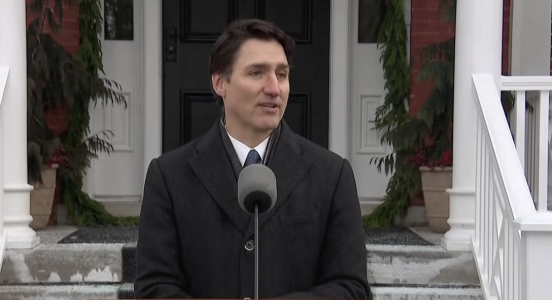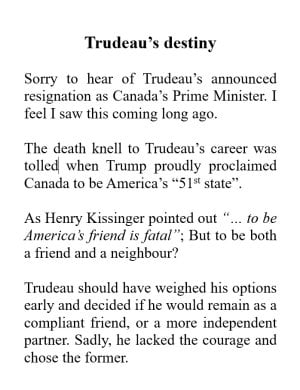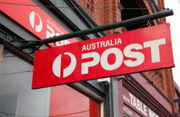Justin Trudeau announces resignation as Canada’s Prime Minister after nine years
By
Seia Ibanez
- Replies 38
Prime Minister Justin Trudeau, a name synonymous with Canadian politics, has been at the helm since 2015, bringing with him a wave of optimism and a promise of progressive change.
His leadership, however, has not been without controversy.
In a shocking move, Prime Minister Justin Trudeau has announced his resignation as the leader of the Liberal Party, signalling a potential end to his tenure in power.
This decision comes amidst a backdrop of internal strife and growing public discontent, marking a significant shift in Canada's governance and potentially altering the country's future direction.
The announcement was made early Tuesday AEDT, 7 January, over the rumblings of dissatisfaction within his party and the broader Canadian electorate.

Trudeau cited 'internal battles' as a key reason for his decision, acknowledging that he would not be able to lead the party into the next elections.
‘I don't easily back down faced with a fight, especially a very important one for our party and the country. But I do this job because the interests of Canadians and the well being of democracy is something that I hold dear,’ he said.
He intended to remain as prime minister and the parliament will be suspended until March 24 until the Liberal Party had chosen a new leader.
His planned departure has set the stage for a Liberal Party leadership race, with the future of the party—and the country—hanging in the balance.
‘The Liberal Party of Canada is an important institution in the history of our great country and democracy. A new prime minister and leader of the Liberal Party will carry its values and ideals into that next election,’ Trudeau said.
‘I am excited to see that process unfold in the months ahead.’
The resignation of Trudeau's finance minister, Chrystia Freeland, earlier in December was a precursor to the current upheaval.
Freeland's departure, along with her criticism of some of Trudeau's economic policies, highlighted the growing turmoil within the government.
This internal discord, coupled with the opposition's threats of a no-confidence vote, has made a spring election almost a certainty.
Trudeau's leadership has been marked by a commitment to liberal values, including championing diversity, gender equality, and environmental stewardship.
His government legalised cannabis and implemented a carbon tax, aiming to balance economic growth with ecological responsibility.
However, these policies have faced criticism from both the right and the left, such as issues on the soaring cost of food and housing and surging immigration.
Opposition Conservative leader Pierre Poillievre said in a recorded message that Canadians were ‘desperate to turn the page on this dark chapter in our history might be relieved’ that Trudeau is leaving.
‘But what has really changed?’ he added.
‘Every Liberal MP in power today and every potential Liberal leadership contender fighting for the top job helped Justin Trudeau break the country over the last nine years.’
The global stage has also presented its challenges, with US President-elect Donald Trump threatening to impose 25 per cent tariffs on Canadian goods, adding pressure to an already strained relationship.
Trudeau has kept silent in the face of these threats and political drama.
‘His long silence following this political drama speaks volumes about the weakness of his current position,’ Daniel Béland, a political science professor at McGill University in Montreal, said.
As Canadians reflect on Trudeau's legacy, they will undoubtedly consider his efforts to uphold the values instilled by his father, Pierre Trudeau, who led the country for nearly 16 years.
Justin Trudeau's tenure has been a blend of his father's charisma and his unique approach to governance, but whether this blend has been successful remains a topic of debate.
You can watch The Times and the Sunday Times’ coverage below:
Credit: The Times and the Sunday Times / YouTube

How do you perceive Justin Trudeau's impact on Canada, and what are your hopes for the country's future leadership? Share your thoughts with us in the comments below!
His leadership, however, has not been without controversy.
In a shocking move, Prime Minister Justin Trudeau has announced his resignation as the leader of the Liberal Party, signalling a potential end to his tenure in power.
This decision comes amidst a backdrop of internal strife and growing public discontent, marking a significant shift in Canada's governance and potentially altering the country's future direction.
The announcement was made early Tuesday AEDT, 7 January, over the rumblings of dissatisfaction within his party and the broader Canadian electorate.

Justin Trudeau has stepped down as Canada’s Prime Minister. Credit: The Times and The Sunday Times / YouTube
Trudeau cited 'internal battles' as a key reason for his decision, acknowledging that he would not be able to lead the party into the next elections.
‘I don't easily back down faced with a fight, especially a very important one for our party and the country. But I do this job because the interests of Canadians and the well being of democracy is something that I hold dear,’ he said.
He intended to remain as prime minister and the parliament will be suspended until March 24 until the Liberal Party had chosen a new leader.
His planned departure has set the stage for a Liberal Party leadership race, with the future of the party—and the country—hanging in the balance.
‘The Liberal Party of Canada is an important institution in the history of our great country and democracy. A new prime minister and leader of the Liberal Party will carry its values and ideals into that next election,’ Trudeau said.
‘I am excited to see that process unfold in the months ahead.’
The resignation of Trudeau's finance minister, Chrystia Freeland, earlier in December was a precursor to the current upheaval.
Freeland's departure, along with her criticism of some of Trudeau's economic policies, highlighted the growing turmoil within the government.
This internal discord, coupled with the opposition's threats of a no-confidence vote, has made a spring election almost a certainty.
Trudeau's leadership has been marked by a commitment to liberal values, including championing diversity, gender equality, and environmental stewardship.
His government legalised cannabis and implemented a carbon tax, aiming to balance economic growth with ecological responsibility.
However, these policies have faced criticism from both the right and the left, such as issues on the soaring cost of food and housing and surging immigration.
Opposition Conservative leader Pierre Poillievre said in a recorded message that Canadians were ‘desperate to turn the page on this dark chapter in our history might be relieved’ that Trudeau is leaving.
‘But what has really changed?’ he added.
‘Every Liberal MP in power today and every potential Liberal leadership contender fighting for the top job helped Justin Trudeau break the country over the last nine years.’
The global stage has also presented its challenges, with US President-elect Donald Trump threatening to impose 25 per cent tariffs on Canadian goods, adding pressure to an already strained relationship.
Trudeau has kept silent in the face of these threats and political drama.
‘His long silence following this political drama speaks volumes about the weakness of his current position,’ Daniel Béland, a political science professor at McGill University in Montreal, said.
As Canadians reflect on Trudeau's legacy, they will undoubtedly consider his efforts to uphold the values instilled by his father, Pierre Trudeau, who led the country for nearly 16 years.
Justin Trudeau's tenure has been a blend of his father's charisma and his unique approach to governance, but whether this blend has been successful remains a topic of debate.
You can watch The Times and the Sunday Times’ coverage below:
Credit: The Times and the Sunday Times / YouTube
Key Takeaways
- Canadian Prime Minister Justin Trudeau has announced his resignation as the leader of the Liberal Party, signalling the end of his time in power.
- Parliament is expected to be suspended until March 24, allowing time for a Liberal Party leadership race to proceed.
- Trudeau's leadership faced criticism for issues including the cost of living and immigration policies, contributing to his decline in popularity.
- Trudeau's resignation comes amid demands from all three major opposition parties to topple the Liberal government in a no-confidence vote when Parliament resumes.
Last edited:








